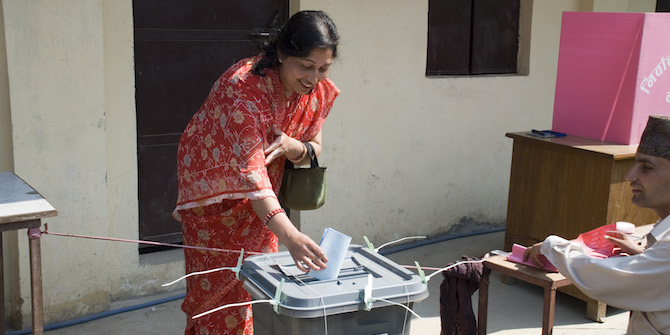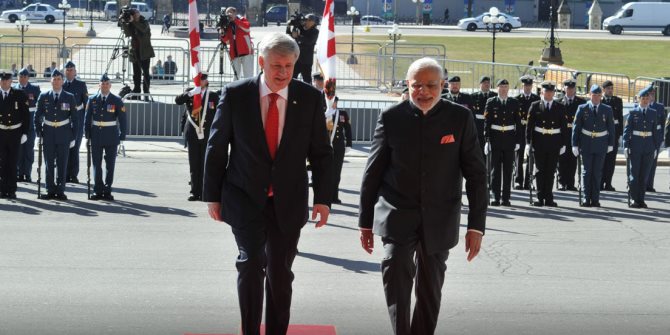 It has been 14 years since local elections have been held in Nepal, and as a result democratisation at local level has stalled despite periodic national elections. Thanesh Bhusal explores why elections at local level have been suspended for so long, the impact this has had on citizen participation and the prospects for the revival of local elections in the near future.
It has been 14 years since local elections have been held in Nepal, and as a result democratisation at local level has stalled despite periodic national elections. Thanesh Bhusal explores why elections at local level have been suspended for so long, the impact this has had on citizen participation and the prospects for the revival of local elections in the near future.
Since 1950s, Nepal has promulgated seven constitutions, and since the 1990s at least 20 governments have been formed under 3 different constitutional frameworks. These numeric developments alone highlight how fragile Nepal’s democracy is. What is more, there have been no local elections for 15 years and as a result the democratisation process at the local level has been at the crossroads for decades.
To the outside world, Nepal has been conducting broadly free and fair elections on a regular basis, thus adhering to the minimum requirements of democracy. Two lots of elections were held for the Constituent Assembly (in 2008 and 2013) which did bring people’s representatives in the national political scene. However, the persistent lack of local elections despite dozens of political commitments, repeated demands from ordinary citizens and various constitutional provisions means democracy remains heavily centralised, undermining the civic rights that have been coded in all of the constitutions implemented in the last two and half decades.

This article sheds lights on some of the implications of absence of the local elections on democracy in general, and citizen participation in particular in Nepal. First, I discuss why Nepal has failed to hold local elections. Then I present some of the implications of this have had on citizen participation in local governance.
According to the prevailing Local Self-Governance Act, 1999, local bodies should be governed by elected authorities and two lots of elections were held in the 1990s. However, elections then ceased due to threats from the Maoist insurgents, who objected to local elections as they wanted the government to solve the national problems first. The failure to hold timely elections for local bodies sparked a democratic crisis, which resulted in the government delegating the rights and duties of local democratic institutions to centrally appointed bureaucrats. Subsequent political developments including the King’s ambitious move to declare a state of emergency in 2005, the April 2006 revolution, and national elections for Constituent Assembly (CA) further shadowed the government’s ability to conduct local elections. Thus, for over 14 years, bureaucrats have been managing the local bodies in different political capacities such as the councillors and the mayor.
There have been three major barriers to reviving local elections. The first of is that politics has been extremely centralised, and therefore local elections have never been a national priority. In the early years of political vacuum in 2000s, politicians were more concerned about how to negotiate with the Maoist rebels and settle the conflict. By the middle of the first decade of the new millennium, which saw a historic political change as the Maoists joining the political mainstream, attention turned towards institutionalising the change through the CA. When the first CA failed to produce a Constitution, the centralisation of politics continued with the second CA elections.

The second issue is weakening demand for local elections. In the early years of political vacuum at the local level, the demand side was so strong to the extent that the ambitious King was forced to conduct elections for municipalities. Civil society organisations including the Association of District Development Committees (ADDCN), Association of Municipalities (MuAN) and National Association of Village Development Committees (NAVIN) have been continuously campaigning for local elections but their voice has not been seriously heard by the government. It has become ‘normal’ for political parties to support the demands for local elections while in opposition, and promptly forget their promises once in power. Despite reports from oversight agencies such as the Commission for Investigation of Abuse of Authority (CIAA), Office of Auditor-General (OAG) and National Vigilance Centre (NVC) that the absence of elected authorities at the local level has worsened the quality of local democracy.
The third and most important aspect of electoral deficit at the local level in Nepal is the commencement of governance debates around the issues of federalism, especially from the mid of 2000s. The Fifth Amendment to the Interim Constitution of Nepal, 2007 cleared the path to exercise state power based on the principles of federalism. This policy was partially welcomed, as activists hoped that it could potentially long standing problems like outdated practices of power and resource centralisation. Many still believe that unless federal structures are institutionalised, it is worthless to conduct local elections. This argument has been recently reiterated by some Madhesi politicians.
On top of these three barriers, the recent local governance reforms initiated by the central government have amalgamated many villages and turned them into municipalities. These reforms have hinted that local governance will be massively restructured in near future. A formal local governance structure reform committee has been established in the Ministry of Federal Affairs and Local Development to recommend the government with appropriate measures to be taken as per the prevailing Constitution of Nepal, 2015.
What have been the implications of running local bodies by unelected officials for such a long time? Well, among others, corruption has increased, accountability has diminished, the pace of development has decelerated, and channels for the development of new leaders have been restricted. The most severe impact (that is rarely acknowledged) has been on citizen participation. How are citizens participating in the decision-making systems that affect them?
In liberal democracy, participation of citizens in decision-making is possible only when there are free, fair and regular elections. It is generally believed that people participate in decision-making through different mechanisms, such as voting. Through periodic elections, people are empowered to influence decisions. But in the absence of local elections Nepalis have restricted to have their say in the systems that affect them because their opportunities to vote and engage are limited.
Nevertheless, a number of administrative reforms in the past decade have highly valued the notion of citizen participation in Nepal. In collaboration with a number of international aid agencies, the government has created different forms of community-based organisations such as the Ward Citizens Forums (WCFs) and Civic Awareness Centres (CACs). Traditional forms of civil society organisation such as Tole Lane Organisations have been revitalised. Although there remains some contestation regarding the extent to which these initiatives are democratic, and the extent to which they facilitate citizen participation, these should be recognised as complementary initiatives to more formal local democracy.
Another local governance initiative that has been fostering citizen participation, particularly during these difficult times, is participatory planning. This is a local governance process that is designed to formulate annual budget and plans for the local level in a participatory manner. All local bodies have been given a greater level of autonomy and flexibility in the design and operationalisation of participatory planning. Strategies such as the mandatory budget allocation for minorities and inclusive governance practices have broadened, if not deepened, citizen participation although the quality of engagement needs more analysis.
In this context, at least two prospects for local democracy have been seen in Nepalese politics over the past few weeks. First, The Supreme Court of Nepal has ordered to the Government of Nepal to hold local elections in Nepal, in a writ petition jointly filed by three associations of local bodies viz. ADDCN, MuAN and NAVIN. Second, and most probably as a response to this Supreme Court order, the government has officially proposed with the parliament to conduct local elections in November this year. There remains a question of to what extent the government is really willing or able to follow through (especially as the country has not yet institutionalized its federal structure). However, these two developments mark significant breakthroughs for local democracy in Nepal.
Note: This article gives the views of the author, and not the position of the South Asia @ LSE blog, nor of the London School of Economics. Please read our comments policy before posting.
About the Author
 Thanesh Bhusal is a PhD Student at the Institute for Governance and Policy Analysis, University of Canberra in Australia. His study is funded by the Australian government through its Australia Awards Scholarship program. He holds two Masters degrees in the field of public administration (2008) and management (2011), from Nepal and Germany respectively.
Thanesh Bhusal is a PhD Student at the Institute for Governance and Policy Analysis, University of Canberra in Australia. His study is funded by the Australian government through its Australia Awards Scholarship program. He holds two Masters degrees in the field of public administration (2008) and management (2011), from Nepal and Germany respectively.






Congratulations my dear dost vai